Books
Books

Fraitaxtsēs sores tsîn ge ra≠gâ – Ondjembo yo Null Vier
A complete documentation on a multimedia exhibition by Berlin-based artist Ixmucané Aguila, giving voice to voiceless descendants of victims of genocide in Namibia.
Genocide in Namibia is an especially sensitive matter—its history has at times been ignored, underestimated, or even denied outright. In the artistic documentary Fraitaxtsēs sores tsîn ge ra≠gâ – Ondjembo yo Null Vier, Ixmucané Aguilar has worked in close collaboration with Nama and OvaHerero people who vividly evoke memories and rituals of mourning caused by human loss and land dispossession under Imperial Germany's violent occupation.
From these personal encounters emerge portraits, visuals and narratives as documental fragments, consisting of living voices which insist on defending memory as an invocation to witness and never to remain passive in the face of social injustice. Rather than a linear collection of data referring to distant places and its distant past, this work engages with stories as chronicles calling to be recognised as pieces of humanity and time.
Alongside Aguilar's portraits, this publication also contains contributions by human rights attorney Wolfgang Kaleck and the curator of the work Tristan Pranyko, along with poetry by Namibian artists Nesindano Namises, Fritz Isak Dirkse and Prince Kamaazegi, and narratives, testimonies, chants and mourning rituals shared by OvaHerero and Nama people in present-day Namiba.
Published on the occasion of the eponymous exhibition at National Art Gallery of Namibia, Windhoek, in 2023
Ixmucané Aguilar (born 1983) is a Guatemalan Berlin-based visual artist/designer who, through multi-layered documentary photography, engages in extensive field research to put out installations and art publications to relay her work in an artistic language.
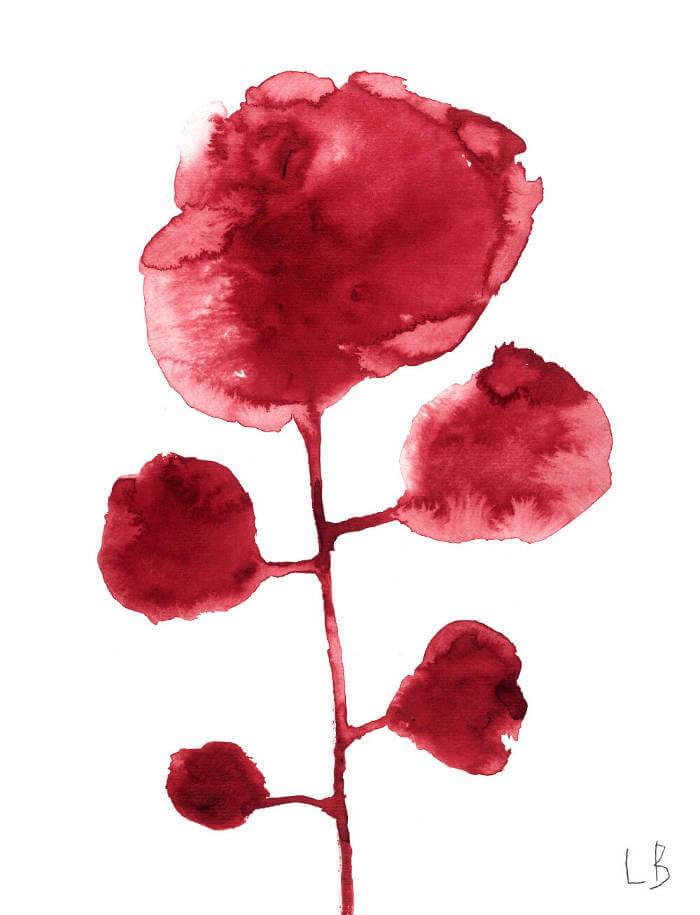
Les Fleurs
Louise Bourgeois' flowers series, painted in gouache on paper.
Born in Paris in 1911 and a New Yorker since 1938, Louise Bourgeois created a unique oeuvre—that owes no allegiance to 20th-century "isms"—in the course of a career than has spanned more than 60 years. Psychologically charged and dealing with the realm of human emotion (love, desire, dependency, sexuality, rejection, jealousy, and abandonment), her art is grounded in her own life and experience: "My goal is to re-experience a past emotion … to relive anxiety … anxiety is a passive state, and the object is to be active and take control." Yet Louise Bourgeois did not create an autonomous universe as an artistic hermit. While her art is nourished by personal experience, it also draws from art and art history—a wellspring of inspiration from which she developed her themes, concepts, and approach to media in both two- and three-dimensional works.
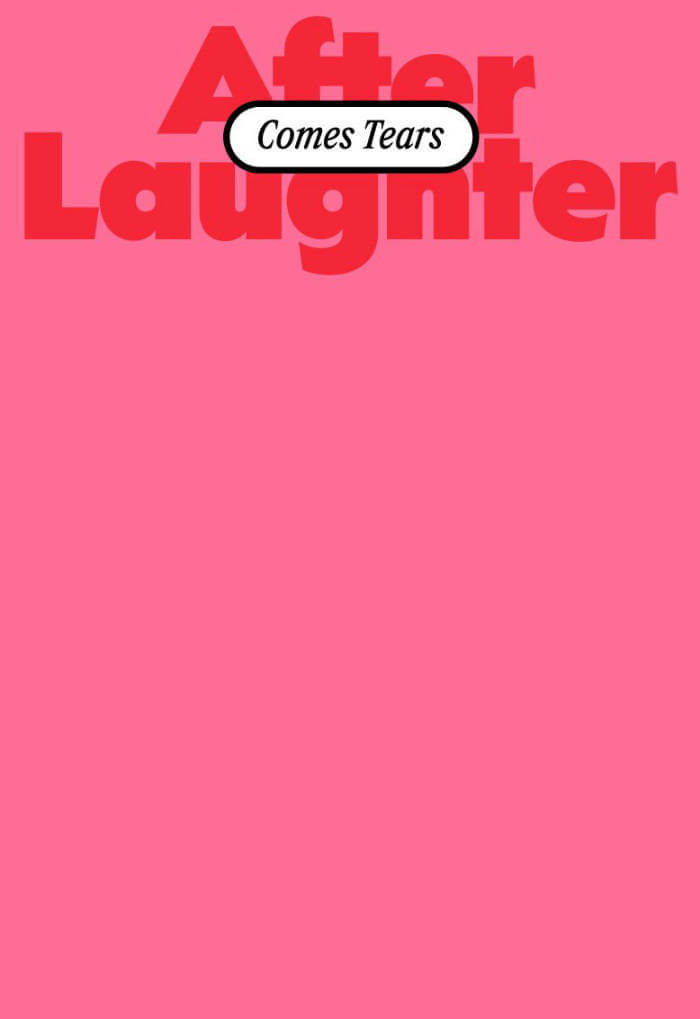
After Laughter Comes Tears
Joel Valabrega, Clementine Proby and 1 more
After Laughter Comes Tears, in its exhibition and book forms, brings together artists from different generations who are experimenting with the idea of the performative. This publication follows the structure of the exhibition at Mudam Luxembourg, with a prologue, four acts and an epilogue, which each sample excerpts from the range of theory, fiction and poetry that inspired and substantiate the themes of the exhibition. Widening the spectrum of the traditional catalogue, each artist was given a "carte blanche"—an invitation to contribute to the book on their own terms.
This performative book was conceived as a story; a story of the pains, joys, anxieties and doubts of the 2020s. It takes as a starting point, the feelings of stasis and anger that define the present stage of late capitalism, framed by the anxieties of a generation facing a climate crisis, welfare states trampled and failed by neoliberal policies and the rise of xenophobia around the globe, partly fueled by fake news spreading on- and offline. It is an intuitive journey through the voices of thirty-four artists expressing the lurid shapes of the crises that surround us and form a (never exhaustive) part of our contemporary reality.
They are Cem A., Panteha Abareshi, Monira Al Qadiri, Kate Cooper, Pauline Curnier Jardin, Jesse Darling, Stine Deja, Omer Fast, Anna Franceschini, Guan Xiao, Sidsel Meineche Hansen, Lukáš Hofmann, Christian Jankowski, Chris Korda, Ndayé Kouagou, Ghislaine Leung, Isaac Lythgoe, Taus Makhacheva, Diego Marcon, Jacopo Miliani, Marie Munk, Chalisée Naamani, Agnieszka Polska, PRICE, Jean-Charles de Quillacq, Mika Rottenberg, Julika Rudelius, Dorian Sari, Sin Wai Kin, Shinuk Suh, Martine Syms, Mungo Thomson, Cajsa von Zeipel, and Artur Żmijewski.
Edited by Clarisse Fahrtmann, Clementine Proby, Joel Valabrega.
Foreword by Bettina Steinbrügge.
Contributions by Kate Cooper, Lukas Hofmann, David McDermott, Markus Pilgram, Agnieszka Polska, Clémentine Proby, Sin Wai Kin, Bettina Steinbrügge, Geraldine Tedder, Joel Valabrega, Lauren Wetmore.

Material Marion von Osten 1 – MoneyNations
The first volume in a series devoted to Marion von Osten's archives, around the MoneyNations project, transversing between art, theory, and activism.
MoneyNations was an exhibition, a webzine, a radio, a conference, a video archive, a printed publication, an infrastructure, a counterpublic, an ongoing discussion, a transnational network of friends. Initiated by Marion von Osten as curator at the Shedhalle Zurich, the project evolved from an urgency to act against the hegemonic forces of "the West" within the radically changing condition of post-Cold War Europe. MoneyNations addressed—and intervened in—the interrelatedness between racist border policies and media representations, exploitative economic relations, and identity-forming processes. The applied methods of critique and organizing, transversing between art, theory, and activism, are made accessible in this volume through images, correspondences, and other ephemera, revealing their political potential for the present. It is contextualized by a conversation between Sezgin Boynik (Rab-Rab Press), Ferdiansyah Thajib (KUNCI Study Forum & Collective), Eleanor Ivory Weber, Camila Willis (Divided Press) and the editors.
The Material Marion von Osten series periodically publishes selected archival documents from von Osten's projects and contextualizes them with new contributions. Correspondences, drafts, scripts, photographs, videos and printed matter serve as the starting point for the publication series which maps the complexity of Marion von Osten's transversal cultural production in its details and specifics.
The artist, curator, researcher, and educator Marion von Osten (1963-2020) lived in Berlin since the early 1990s. Her always collaborative approach manifested in exhibitions, conferences, installations, as well as films, discussions, texts, teachings, or self-published journals. Her projects were all intertwined and carried by her specific way of working: through artistic research and feminist organizing, transnational and committed to the project of decolonization. Amongst her works are the international exhibition series bauhaus imaginista (2018-2020), Viet Nam Discourse (2016-2018) at Tensta Konsthall, Project Migration (2002-2006) in Cologne, and Sex & Space (1996) at Shedhalle Zurich. As collective infrastructures, her collaborations included Labor k3000, kleines postfordistisches Drama (Minor Postfordist Drama, kpD) and the CPKC Center for Postcolonial Knowledge and Culture.
Edited by Lucie Kolb, Jonas von Lenthe, Max Stocklosa.
Conversation between Sezgin Boynik, Ferdiansyah Thajib, Eleanor Ivory Weber, Camila Willis and the editors.
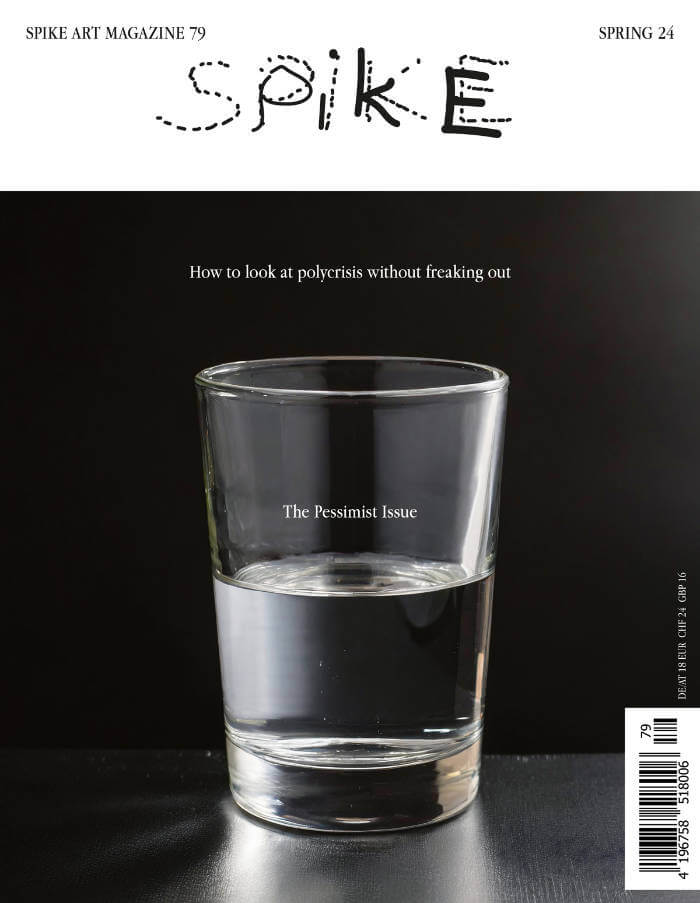
Spike #79 – The Pessimist Issue
How to look at polycrisis without freaking out.
Eco ruin and refugeeism, illiberalization and inequality, hot wars and a New Cold War—the polycrisis hydra is always growing another head. But it's also a state of mind, an identity crisis brought on by paralysis and cognitive shock. Was it always like this, but with less media reach? Or is capitalism really burning itself out, just without any redemptive zest? The arts are expert at thematizing the woes that affect them—hello, Biennale and documenta—but maybe polycrisis is an instructive metaphor for what's breaking creativity: the commercial takeover of discourse, the bureaucratization of curating, and the dopamine highs of self-branding.
Maybe we're at a crossroads between recovery and death. But Spike #79 is clear-eyed about the fact that pessimists are never disappointed.
With Henrike Naumann, Shirin Neshat, Roberto Villanueva, Ben Davis, Mire Lee, Precious Okoyomon, Ivan Cheng, Nil Yalter, Anselm Franke, Anna Jermolaewa, Catherine Liu, Oliver Ressler, Morag Keil, Jeppe Ugelvig and many more.
Founded by the artist Rita Vitorelli in 2004, Spike (Spike Art Quarterly) is a quarterly magazine on contemporary art published in English which aims at sustaining a vigorous, independent, and meaningful art criticism. At the heart of each issue are feature essays by leading critics and curators on artists making work that plays a significant role in current debates. Situated between art theory and practice and ranging far beyond its editorial base in Vienna and Berlin, Spike is both rigorously academic and stylishly essayistic. Spike's renowned pool of contributing writers, artists, collectors and gallerists observe and reflect on contemporary art and analyse international developments in contemporary culture, offering its readers both intimacy and immediacy through an unusually open editorial approach that is not afraid of controversy and provocation.

Otherwise Worlds
Andrea Smith, Jenell Navarro and 1 more
The contributors to Otherwise Worlds investigate the complex relationships between settler colonialism and anti-Blackness to explore the political possibilities that emerge from such inquiries. Pointing out that presumptions of solidarity, antagonism, or incommensurability between Black and Native communities are insufficient to understand the relationships between the groups, the volume's scholars, artists, and activists look to articulate new modes of living and organizing in the service of creating new futures. Among other topics, they examine the ontological status of Blackness and Indigeneity, possible forms of relationality between Black and Native communities, perspectives on Black and Indigenous sociality, and freeing the flesh from the constraints of violence and settler colonialism.
Throughout the volume's essays, art, and interviews, the contributors carefully attend to alternative kinds of relationships between Black and Native communities that can lead toward liberation. In so doing, they critically point to the importance of Black and Indigenous conversations for formulating otherwise worlds.
Contributors. Maile Arvin, Marcus Briggs-Cloud, J. Kameron Carter, Ashon Crawley, Denise Ferreira da Silva, Chris Finley, Hotvlkuce Harjo, Sandra Harvey, Chad B. Infante, Tiffany Lethabo King, Jenell Navarro, Lindsay Nixon, Kimberly Robertson, Jared Sexton, Andrea Smith, Cedric Sunray, Se’mana Thompson, Frank B. Wilderson
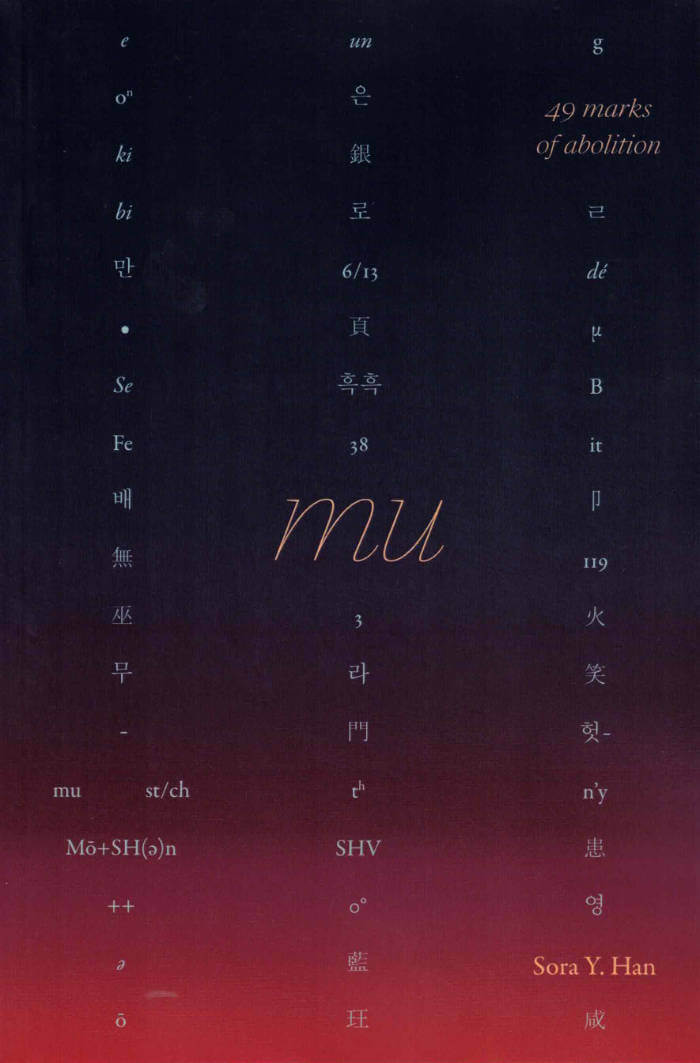
Mu, 49 Marks of Abolition
In March 2020, Sora Y. Han learned her father was dying of cancer just as the COVID-19 pandemic arrived on California's shores. These two events led Han to introspection: “Who have I been writing to?” and “Who have I been writing for?” In her observance of the 49 days of mourning in Buddhist tradition, answers come in the form of mu – no thing, nothingness.
Han’s poetic meditations on freedom struggle come alive in the empty spaces between words, letters, and pictograms spanning her many languages—English, Korean, Chinese, jazz, law, and poetry.
Transliterating and dystranslating the writings of Fred Moten, Theresa Hak Kyung Cha, Jacques Lacan, Frantz Fanon, and others through the Korean alphabet, Han weaves the DMZ, Betty’s Case, the Thirteenth Amendment, Afro-pessimism, and psychoanalytic desire together into the open field of Bay Area radicalism. Mu is both a loving homage to and a playful subversion of political inheritances and the unsayable beyond law.
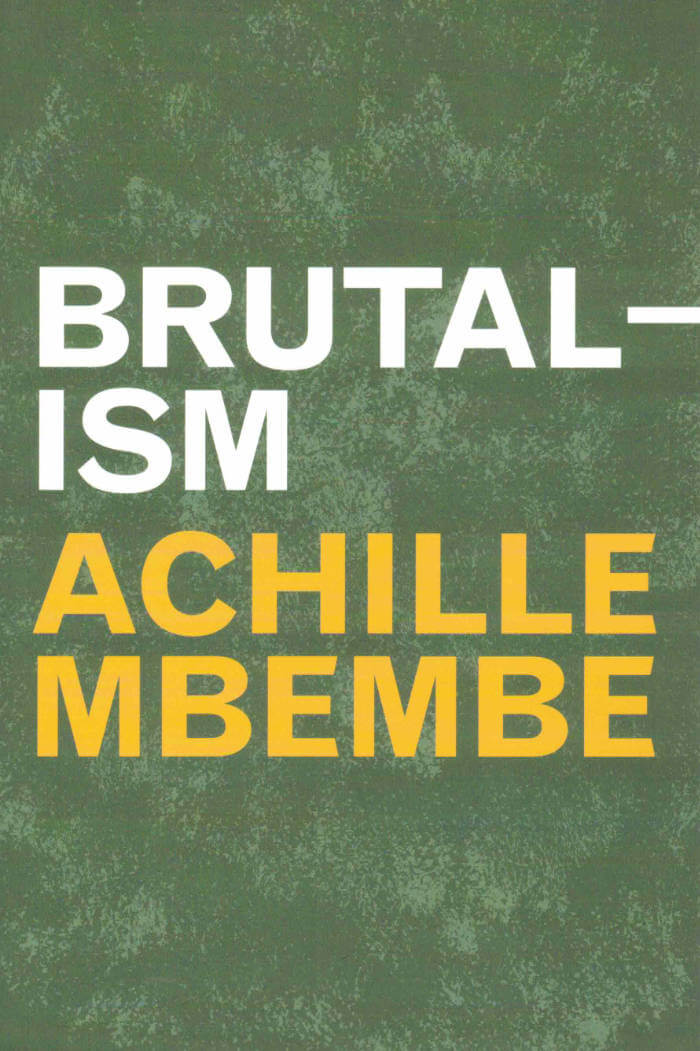
Brutalism
In Brutalism, eminent social and critical theorist Achille Mbembe invokes the architectural aesthetic of brutalism to describe our moment, caught up in the pathos of demolition and production on a planetary scale.
Just as brutalist architecture creates an affect of overwhelming weight and destruction, Mbembe contends that contemporary capitalism crushes and dominates all spheres of existence. In our digital, technologically focused era, capitalism has produced a becoming-artificial of humanity and the becoming-human of machines. This blurring of the natural and artificial presents a planetary existential threat in which contemporary society’s goal is to precipitate the mutation of the human species into a condition that is at once plastic and synthetic.
Mbembe argues that Afro-diasporic thought presents the only solution for breaking the totalizing logic of contemporary capitalism: repairing that which is broken, developing a new planetary consciousness, and reforming a community of humans in solidarity with all living things.
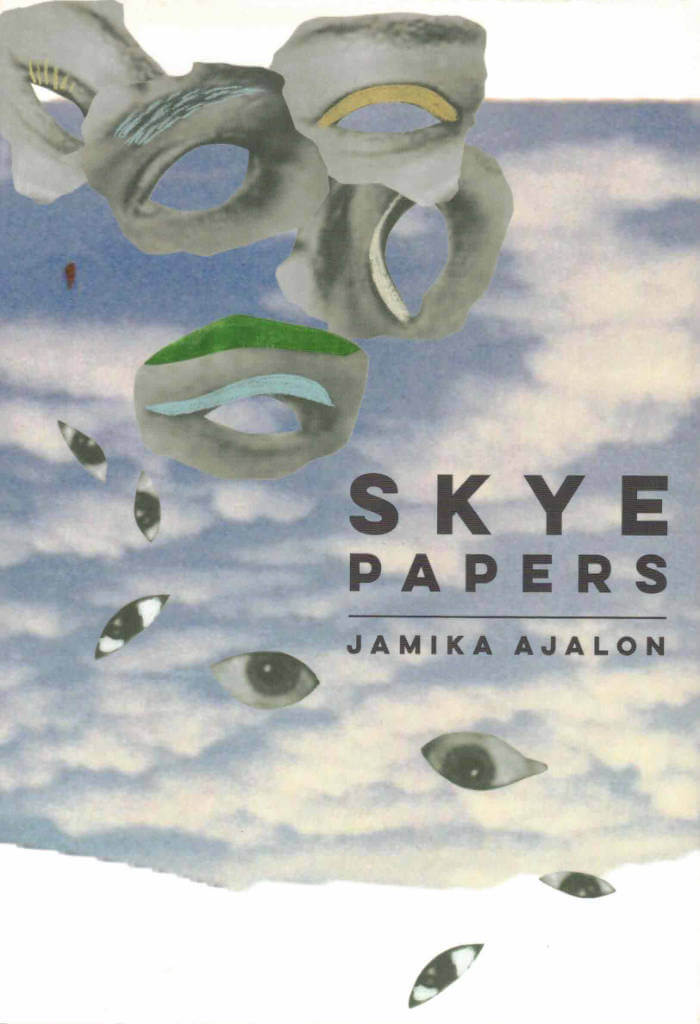
Skye Papers
A dreamy and experimental portrait of young Black artists in the 1990s London underground scene, whose existence is threatened by the rise of state surveillance.
Twentysomething and restless, Skye flits between cities and stagnant relationships until she meets Scottie, a disarming and disheveled British traveler, and Pieces, an enigmatic artist living in New York. The three recognize each other as kindred spirits—Black, punk, whimsical, revolutionary—and fall in together, leading Skye on an unlikely adventure across the Atlantic. They live a glorious, subterranean existence in 1990s London: making multimedia art, throwing drug-fueled parties, and eking out a living by busking in Tube stations, until their existence is jeopardized by the rise of CCTV and policing.
In fluid and unrelenting prose, Jamika Ajalon's debut novel explores youth, poetry, and what it means to come terms with queerness. Skye Papers is an imaginative, episodic group portrait of a transatlantic art scene spearheaded by people of color—and of the fraught, dystopian reality of increasing state surveillance.

The Beauty of the Husband: A Fictional Essay in 29 Tangos
The Beauty Of The Husband is an essay on Keats’s idea that beauty is truth, and is also the story of a marriage. It is told in 29 tangos. A tango (like a marriage) is something you have to dance to the end.
This clear-eyed, brutal, moving, darkly funny book tells a single story in an immediate, accessible voice–29 “tangos” of narrative verse that take us vividly through erotic, painful, and heartbreaking scenes from a long-time marriage that falls apart. Only award-winning poet Anne Carson could create a work that takes on the oldest of lyrical subjects–love–and make it this powerful, this fresh, this devastating.
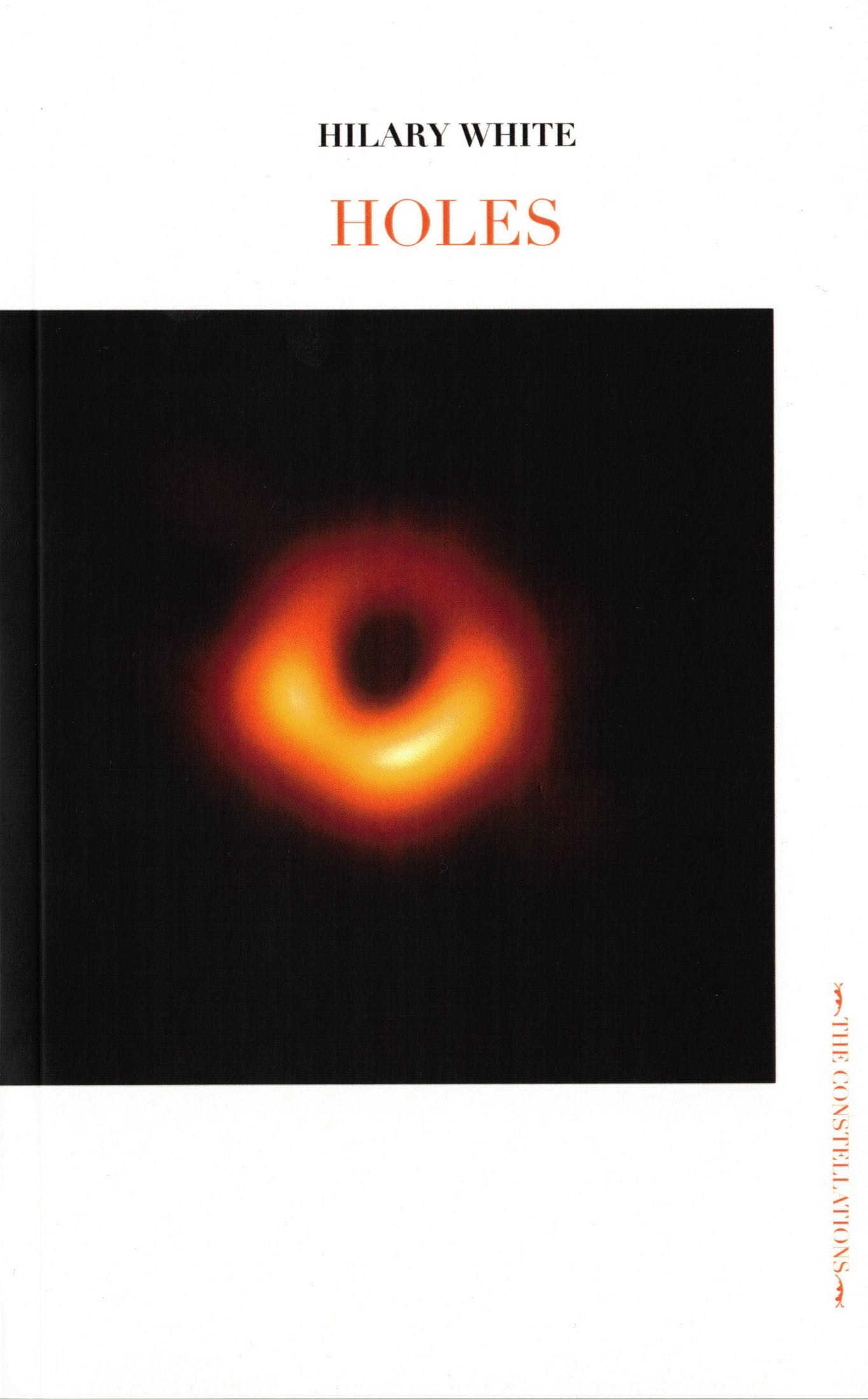
Holes
Sometimes I pretended not to notice it (the black hole), but I knew it was always there. To tell the truth, I started to like having it around. I stuck quite close to it. Not too close, mind you. But it was useful, above all, to have somewhere to put things. Unwanted things. I am attracted to your attraction, he said. (I put it in the hole.) Night by night it got a little bigger.
Holes splices forms of fiction and nonfiction. The narrator, a researcher of limits at an unidentified university, figures her entanglement with an unobtainable love object as the descent into a black hole. Everything she reads seems to shed light on the non-events that comprise their relationship, and study collapses into life as she struggles to separate events and forms, reality and ideation. Holes is a study in thematic fixation, engaging a range of ‘obsessional artists’ (including Yayoi Kusama, from whom the term is borrowed, Lee Bontecou, and Carolee Schneemann) for whom holes—as idea, imagery, philosophy—have proved evocative, inviting, and occasionally obliterative.
Hilary White is a writer and researcher, currently an IRC postdoc at Maynooth University, Ireland, working on a project entitled Forms of Sleep. She co-ran the experimental poetry reading and commission series, No Matter, in Manchester, and co-edited the zine series, Academics Against Networking. Her writing appears in MAP, Banshee, zarf, and The Stinging Fly. Holes is her first novel.

Sore
Sore is a publication that brings together seven texts by authors whose writing practice oscillates between the genres of diary and fiction. Observations of every- day life, memories and cultural references intertwine to form an ensemble of texts that highlight the significance of the soreness we carry within us.
With contributions from : Niklas Büscher, Tindra Eliason, Céline Mathieu, Jonathan Lubasch, E. Eriskat, Emma Bombail and Bryony Dawson + an introduction by Mathilde Heuliez.
Graphic design: Lisa Lagova

Ornamenti: An experiment on puppet furniture and beauty props
Featuring "Pebbles, Chrome, Silk, Cedar and Anecdotes", a short story by Lucy McKenzie.
Photographs: Camille Vivier
Publication layout: Alice Zani

A Very Large Array: Selected Poems
Osman's writing reinvents poetry as an instrument for dissecting vision, language and power
This extensive collection of poet Jena Osman's acclaimed work spans more than 30 years, gathering poems from journals and books long out of print. Her poetry traces overlooked visual and linguistic incidents across centuries of American history, transforming "official" language—from Supreme Court opinions to the chatter of Predator drone pilots—into writing that is comic, chilling and relentlessly inventive.
Jena Osman's (born 1963) books include Motion Studies (Ugly Duckling Presse, 2019), Public Figures (Wesleyan University Press, 2012), The Network (Fence Books, 2010, selected for the National Poetry Series in 2009), An Essay in Asterisks (Roof Books, 2004) and The Character (Beacon Press, winner of the 1998 Barnard New Women Poets Prize). She lives in Philadelphia.
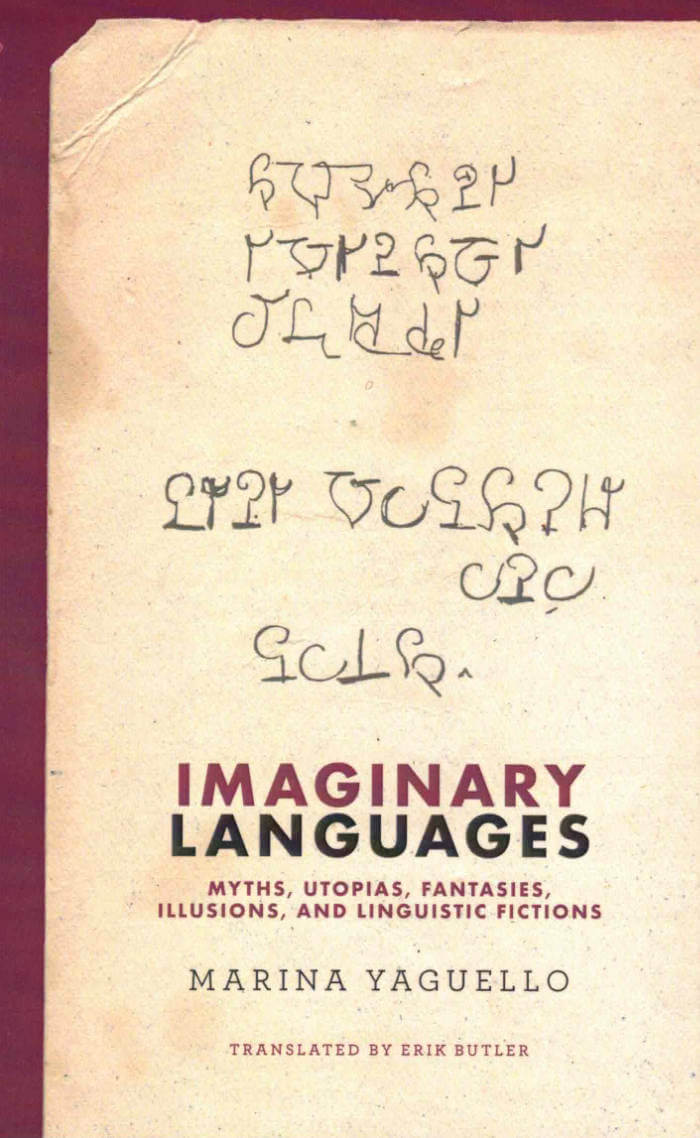
Imaginary Languages: Myths, Utopias, Fantasies, Illusions, and Linguistic Fictions (paperback)
In Imaginary Languages, Marina Yaguello explores the history and practice of inventing languages, from religious speaking in tongues to politically utopian schemes of universality to the discoveries of modern linguistics. She looks for imagined languages that are autonomous systems, complete unto themselves and meant for communal use; imaginary, and therefore unlike both natural languages and historically attested languages; and products of an individual effort to lay hold of language. Inventors of languages, Yaguello writes, are madly in love: they love an object that belongs to them only to the extent that they also share it with a community.
Yaguello investigates the sources of imaginary languages, in myths, dreams, and utopias. She takes readers on a tour of languages invented in literature from the sixteenth to the twentieth century, including that in More's Utopia, Leibniz's "algebra of thought," and Bulwer-Lytton's linguistic fiction. She examines the linguistic fantasies (or madness) of Georgian linguist Nikolai Marr and Swiss medium Hélène Smith; and considers the quest for the true philosophical language. Yaguello finds two abiding (and somewhat contradictory) forces: the diversity of linguistic experience, which stands opposed to unifying endeavors, and, on the other hand, features shared by all languages (natural or not) and their users, which justifies the universalist hypothesis.
Recent years have seen something of a boom in invented languages, whether artificial languages meant to facilitate international communication or imagined languages constructed as part of science fiction worlds. In Imaginary Languages (an updated and expanded version of the earlier Les Fous du langage, published in English as Lunatic Lovers of Language), Yaguello shows that the invention of language is above all a passionate, dizzying labor of love.

Why Do Hoodie Strings Taste So Good?
This text is an attempt to explain the importance of comfort regulation, through sensory stimulation. Whether that be from fidgeting, through masturbation to cuddling and other activities. This thesis is about self-regulation and the objects which visualise that need. From the Freudian psychoanalysis idea of child development through transitional objects introduced by Donald Winnicot to Dakimakura phenomena in otaku culture in a Japanese society that seeks closeness to cute pastelle vibrators which are overflowing the sex toys market. The attempt to answer this question: “Why do hoodie strings taste so good?” seeks to answer the overarching need for constant adjustment to the environment we live in.
I’m intrigued by the need for biting, sucking, and tapping random objects. The fidgeting era is here! We are overwhelmed by all kinds of spinners, popping toys, anti-stress devices, dopamine booster, etc. What is it all about and why have fidget spinners became such a hype in the recent years? Have you ever considered why your hoodie strings taste so good? Have you caught yourself while compulsively sucking them in the metro or at the bus stop? This thesis will endeavour to answer these questions. The answer might be much easier and more pragmatic than we think. In contradiction to my deep analysis in the following sections, one of the reddit users wrote in response to the above question: Why do hoodie strings taste so good?
“Just don’t do it! After sucking them a few times, they become bacteria factories/colonies, so taste (and probably smell) evolves over time. Don’t suck and chew them!! They do, however, work as good, reachable things to practise finger dexterity – to tie knots into and practice rope binding”
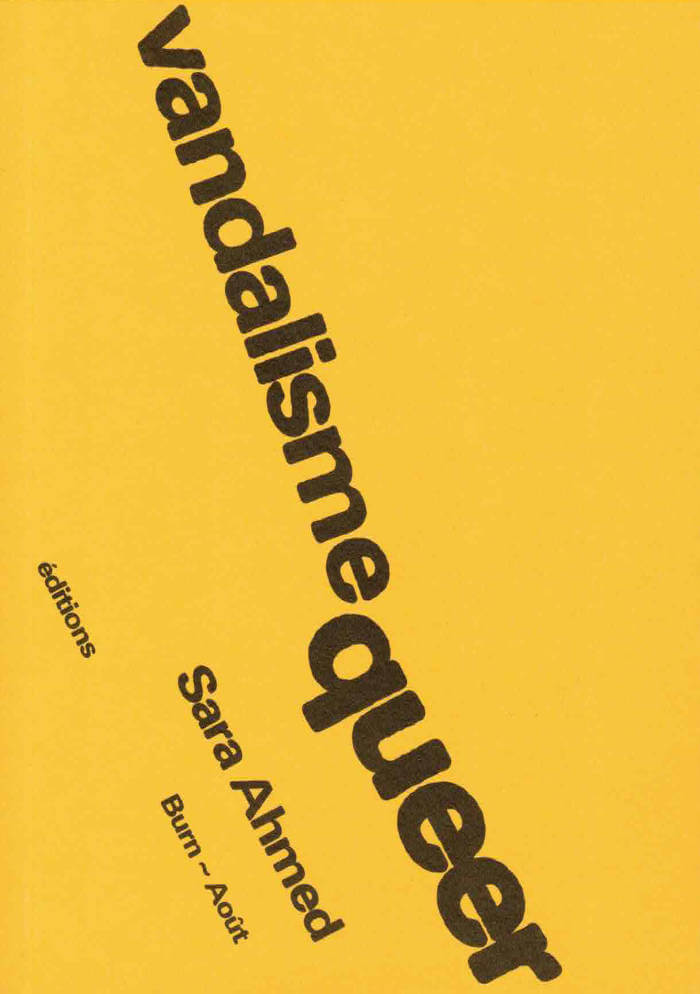
Vandalisme queer
Sara Ahmed, Mabeuko Oberty and 1 more
La philosophe Sara Ahmed se présente parfois comme « une rabat-joie féministe, une alienne affective, une femme queer racisée en colère ». Depuis plus de dix ans, elle tient un blog, feministkilljoys.com, où elle publie des morceaux de ses livres et de ses conférences. Dedans, on trouve des bouts de rages - contre le harcèlement sexuel à la fac où elle enseigne, contre le racisme institutionnel, contre le capitalisme carcéral... — mais aussi des célébrations des solidarités et des activismes transféministes. De là sont extraits les trois textes rassemblés dans ce court recueil, « Vandalisme queer », « Usage queer» et « La plainte, méthode queer»; des textes qui ont tous pour point commun de réfléchir aux potentiels d'interruption du mot queer. Queer, oblique, pas droit.e.s, déviant.e.s : des termes pour se mettre en travers des chemins trop bien tracés. Des textes comme autant d'appels à multiplier les existences vandales.
Un tuyau percé peut mener à un autre; il peut le faire et il le fait. Il suffit parfois de desserrer un écrou, un petit peu, juste un tout petit peu, pour que l'explosion ait lieu. Et nous avons besoin de plus d'explosions. Les usages queers, les usages obliques, décrivent ce potentiel d'explosion. Ils décrivent la manière dont les petites déviations, les petits desserrements, la création d'une issue de secours, l'ouverture d'une échappée, peuvent aider à multiplier toutes sortes de fuites et de sorties.

Quels problèmes les artistes éditeurices peuvent-iels résoudre ?
Temporary Services et PrintRoom ont invité dix-sept artistes éditeurices à répondre à la question suivante: En réfléchissant aux échelles locale, régionale, nationale et internationale, quels sont les problèmes sociétaux, politiques, économiques et écologiques que les artistes éditeurices sont équipées à aborder et à résoudre en utilisant leurs connaissances, leurs compétences et leurs ressources?
PrintRoom est un espace de présentation et de vente basé à Rotterdam, et dédié aux éditions d'artistes. Depuis 2012, PrintRoom gère un atelier de risographie où artistes, designers et autres curieux ses peuvent prendre part à des workshops ou imprimer leurs propres projets. PrintRoom est né en 2003 à partir d'une collection itinérante, encore en développement, d'éditions d'artistes. En 2010, l'initiative se dota d'une adresse fixe à Rotterdam (au 17 Schietbaanstraat), où elle devint une plateforme palpitante pour promouvoir et vendre des éditions faites par des artistes, des designers et des éditeurices venant de partout dans le monde. La collection PrintRoom comprend divers types de documents allant de l'édition en couleur savoureusement conçue au modeste flipbook ou au zine photocopié. L'espace accueille des discussions, des présentations, des lancements de livre et des workshops qui questionnent les méthodes des artistes de l'édition indépendante.
Temporary Services est composé de Brett Bloom et de Marc Fischer. Nous sommes basés à Auburn (dans l'Indiana) et à Chicago (dans l'Illinois). Nous existons, bien qu'il y eut plusieurs changements d'équipe et de structure, depuis 1998. En 2008, nous avons fondé les éditions et la boutique en ligne Half Letter Press. Nous produisons des expositions, des évènements, des projets et des éditions. La distinction entre une pratique artistique et d'autres projets créatifs menés par des humains n'est pas pertinente pour nous.

Hot Wings and Tenders
Hot wings and tenders est un recueil de poèmes bilingue anglais/français qui décline l'exploration d'une jeune femme queer de son corps, sa sexualité, et ses modalités d'existence matérielles. Alternativement tendres, crus, drôles et vifs, les poèmes de Marl Brun utilisent des protocoles d'écriture en apparence mathématiques pour tenter de capturer l'absurde logique du monde. Ils sont les énoncés analytiques d'une intimité qui demeure sensible et échappe à toute tentative de rationalisation.

Bezdorijia, chroniques d’un voyage en Ukraine
Bezdorijia, chroniques d'un voyage en Ukraine est un recueil de textes écrits en 2022 en Ukraine. Un mois après le déclenchement de la guerre, une bande d'ami·es décident de se rendre sur place, animées à la fois par l'envie de mieux comprendre ce qu'il se passe et par celle d'apporter du soutien matériel au peuple ukrainien en lutte contre l'envahisseur. Sur un blog à destination de leurs proches, iels témoignent de la complexité de la situation, des rencontres que ce voyage les amène à faire et iels rendent compte, par le prisme de l'internationalisme, du quotidien d'un peuple qui résiste à la guerre grâce à des pratiques d'auto-organisation.
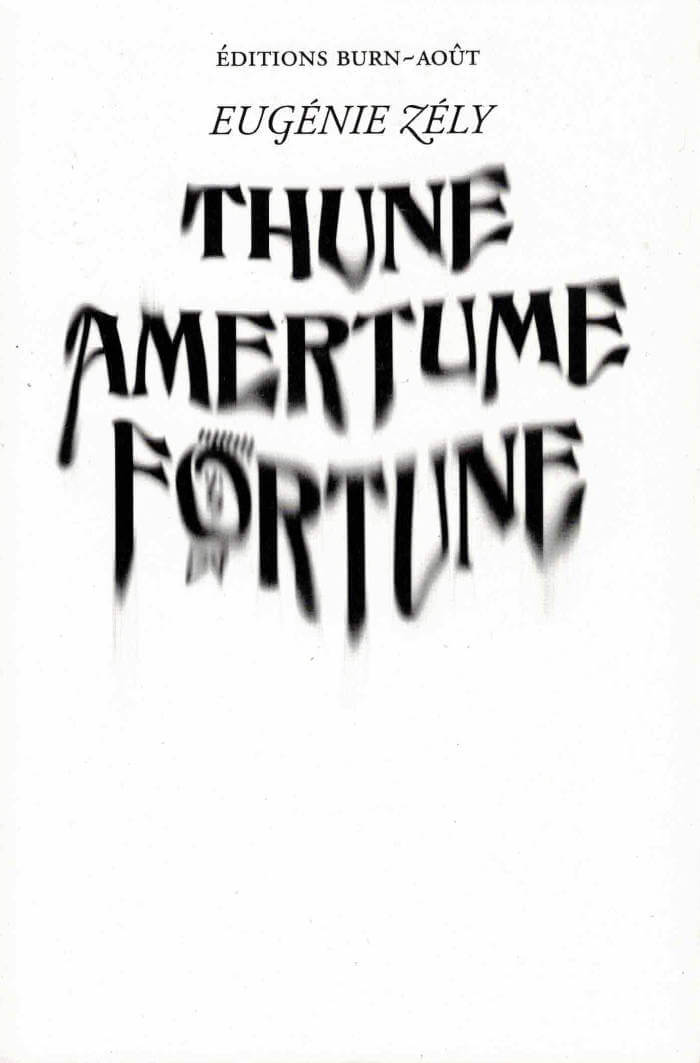
Thune amertume fortune
Thune Amertume Fortune raconte la possibilité d’une révolution. Eva Sig est pauvre. Elle vit en Vendée. Ses journées sont organisées autour de la nécessité de ne pas exercer de travail salarié. Elle met en place toutes sortes de stratégies d’évitement : de la pensée magique à la privation. Laura et Marine sont ses amies. Marine est obsédée par les maisons, Laura par le bien-être. La voyante gagne sa vie en comblant le désir libéral capitaliste de réponses (elle le sait) de ses clientes. Andrea Quem est rencontrée par Eva Sig dans un NOZ, quelque chose change. La coach sportive dont le monde est réduit à une estrade devant un miroir raconte sa vie en détail avant de donner son cours de Zumba. Eva Sig meurt. Andrea Quem disparaît. La révolution a lieu.

ROSE2RAGE
"Cascada s'écoute à fond ou ne s'écoute pas". C'est la phrase qu'enfant déjà, Théophylle Dcx se répètait quand ses parents lui demandaient de baisser le son, de l'autre côté de la porte de sa chambre. De ses danses de survie sur ses tubes d'adolescence jusqu'à l'écoute collective et festive de leurs remix versions nightcore des années plus tard, Théophylle Dcx nous fait le récit de son histoire.
Il écrit ce que peut être la vie d'une jeune personne queer séropo, aujourd'hui travailleur du sexe ; les violences qui la traversent, tout comme les moments de jouissance qui la rendent flamboyante. Son texte est surtout un puissant hommage à son amitié avec Alexandre, son camarade de vie et de danse, décédé une année plus tôt.
L'écriture de Théophylle Dcx, rythmée, découpée, évoque un besoin urgent de retracer les affects qui le parcourent. Ce texte à la première personne, sensible et enflammé, est un précieux geste de partage et d'émancipation.

On Letters
On Letters is an epistolary essay, structured as thirteen wide-ranging and personal letters to the late conceptual artist On Kawara. Playing with language and its limits, the letters focus first on the artist’s five decade long body of “Date Paintings” and their relationship to typography. Yet from this starting point, the writing swerves to encompass topics such as the creative process, mindfulness, numbering systems, race, narrative structures, and more. On Letters is a unique glimpse into one artist’s inner dialogue and an exploration of how the solitary practice of artmaking can spark other transformations in the world.
"No one is better placed to reflect on On Kawara’s perfect marriage of typography and ontology than Prem Krishnamurthy. An intellectual triumph and a true labour of love." —Tom McCarthy
Prem Krishnamurthy (b. 1977) is a designer, author, and educator. He directs Wkshps, a multidisciplinary design consultancy and organizes Department of Transformation, an emergent, itinerant workshop that practices collaborative tools for social change. He has directed and curated large-scale exhibitions including Oh, Gods of Dust and Rainbows, the 2022 edition of FRONT International: Cleveland Triennial for Contemporary Art; Our Silver City, 2094 at Nottingham Contemporary; and Ministry of Graphic Design in Sharjah, UAE.
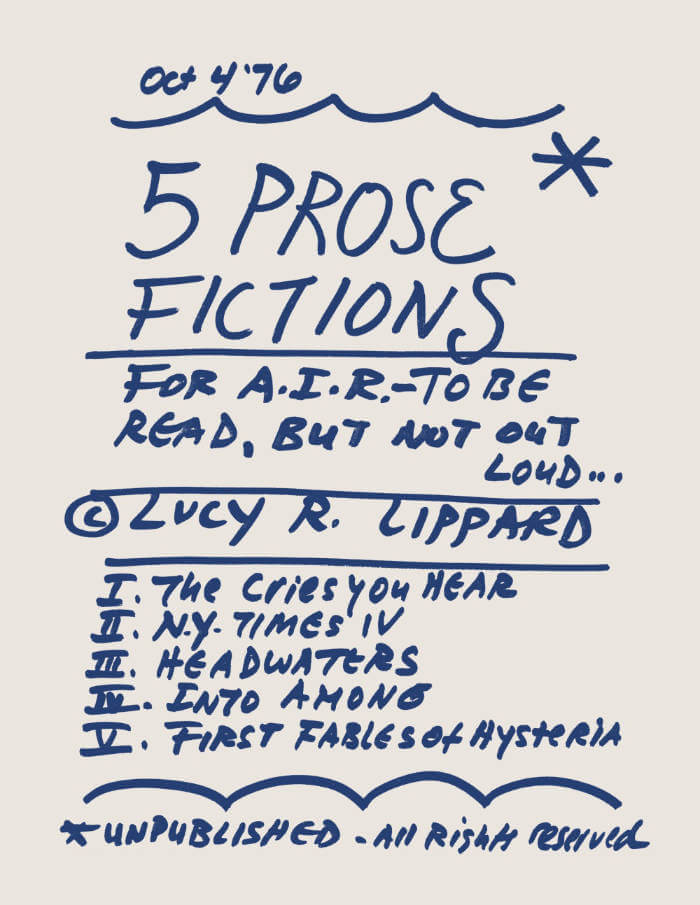
5 Prose Fictions
Originally self-released in 1976 through A.I.R. Gallery, New York, the five short unpublished manuscripts collected in 5 Prose Fictions offer an abbreviated introduction to curator Lucy R. Lippard’s largely under-examined fictional work.
The republication of these pieces follows the recent rerelease of I See / You Mean and provides further context for the released of Brimstone this Fall, an anthology compiling over 50 of Lippard’s experimental and narrative fiction works from the early 1950s through the 1980s.